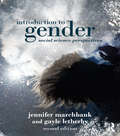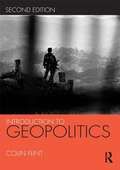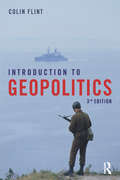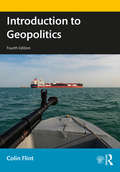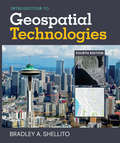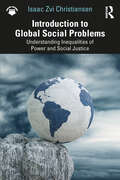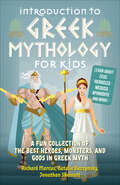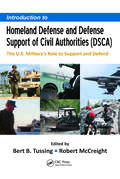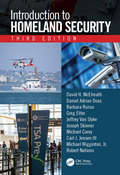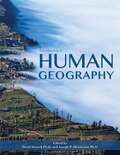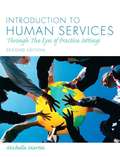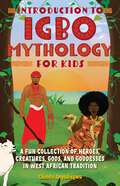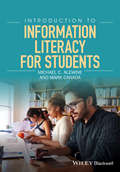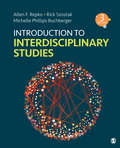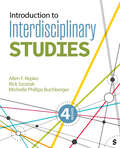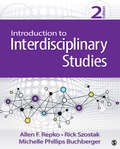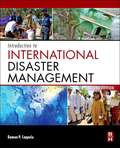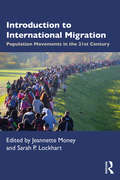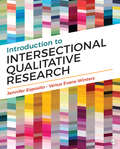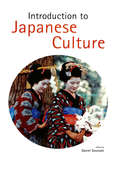- Table View
- List View
Introduction to Gender: Social Science Perspectives
by Gayle Letherby Jennifer MarchbankThoroughly updated in this second edition, Introduction to Gender offers an interdisciplinary approach to the main themes and debates in gender studies. This comprehensive and contemporary text explores the idea of gender from the perspectives of history, sociology, social policy, anthropology, psychology, politics, pedagogy and geography and considers issues such as health and illness, work, family, crime and violence, and culture and media. Throughout the text, studies on masculinity are highlighted alongside essential feminist work, producing an integrated investigation of the field. Key features: A thematic structure provides a clear exploration of each debate without losing sight of the interconnections between disciplines. World in focus boxes and international case studies offer a broad global perspective on gender studies. In-text features and student exercises, including Controversy, A critical look and Stop and think boxes, allow the reader to engage in the debates and revise the material covered. Hotlinks throughout the text make connections between chapters, allowing the reader to follow the path of particular issues and debates between topics and disciplines. New to the second edition: A new chapter explores gender through the discipline of philosophy. A new section on international relations brings this relevant topic into focus. Current discussion on the language of gender across Europe is brought in to Chapter 1. A focus on Europe and Scandinavia as well as the UK gives the text a broader scope. Examples are updated throughout to ensure the text is cutting-edge and relevant. Introduction to Gender, second edition is highly relevant to today’s students across the social sciences and is an essential introduction for students of sociology, women’s studies and men’s studies.
Introduction to Geopolitics
by Colin FlintThis clear and concise introductory textbook guides students through their first engagement with geopolitics. It offers a clear framework for understanding contemporary conflicts by showing how geography provides opportunities and limits upon the actions of countries, national groups, and terrorist organizations. This second edition is fundamentally restructured to emphasize geopolitical agency, and non-state actors. The text is fully revised, containing a brand new chapter on environmental geopolitics, which includes discussion of climate change and resource conflicts. The text contains updated case studies, such as the Korean conflict, Israel-Palestine and Chechnya and Kashmir, to emphasize the multi-faceted nature of conflict. These, along with guided exercises, help explain contemporary global power struggles, environmental geopolitics, the global military actions of the United States, the persistence of nationalist conflicts, the changing role of borders, and the new geopolitics of terrorism, and peace movements. Throughout, the readers are introduced to different theoretical perspectives, including feminist contributions, as both the practice and representation of geopolitics are discussed. Introduction to Geopolitics is an ideal introductory text which provides a deeper and critical understanding of current affairs, geopolitical structures and agents. The text is extensively illustrated with diagrams, maps, photographs and end of chapter further reading. Both students and general readers alike will find this book an essential stepping-stone to understanding contemporary conflicts.
Introduction to Geopolitics
by Colin FlintThis new updated edition of Introduction to Geopolitics presents the overarching themes of geopolitical structures and agents in an engaging and accessible manner, which requires no previous knowledge of theory or current affairs. Using new pertinent case studies and guided exercises the title explains the contemporary global power of the United States and the challenges it is facing, the persistence of nationalist conflicts, migration, cyberwar, terrorism, and environmental geopolitics. Case studies of the rise of the so-called Islamic State, the South China Sea disputes, the Syrian civil war, the Korean conflict, and Israel-Palestine emphasize the multi-faceted nature of conflict. The book raises questions by incorporating international and long term historical perspectives and introduces readers to different theoretical viewpoints, including feminist contributions. The new edition features expanded sections on network geopolitics and non-state actors, a new section on geopolitics of transnational business, cyberwar, an interpretation of ISIS within historical geopolitical trends, as well as expanded discussion of the relevance of Boserup and neo-Malthusians to environmental geopolitics. Introduction to Geopolitics will provide its readers with a set of critical analytical tools for understanding the actions of states as well as non-state actors acting in competition over resources and power. Both students and general readers will find this book an essential stepping-stone to a deeper and critical understanding of contemporary conflicts.
Introduction to Geopolitics
by Colin FlintThis new updated edition presents the overarching themes of geopolitical structures and agents in an engaging and accessible manner, which requires no previous knowledge of theory or current affairs. It helps readers understand the geopolitical implications of COVID-19, China’s pronounced role in the world, the relative decline of the US, and the Black Lives Matter movement. Using new pertinent case studies and guided exercises, the title explains the contemporary global power of the United States and the challenges it is facing, the changing foreign policy of China and other countries, the persistence of nationalist conflicts, migration, cyberwar and cyberactivism, terrorism, energy geopolitics, and environmental geopolitics. Expanded case studies of the South China Sea disputes and China’s Belt and Road Initiative emphasize the multi-faceted nature of conflict. The book raises questions by incorporating international and long-term historical perspectives and introduces readers to different theoretical viewpoints, including feminist contributions. The new edition features fresh discussion of island geopolitics, the Anthropocene age, and geoeconomics. Introduction to Geopolitics will provide its readers with a set of critical analytical tools for understanding the actions of states as well as non-state actors acting in competition over resources and power. Both students and general readers will find this book an essential stepping-stone to a deeper and critical understanding of contemporary conflicts. The companion website will enable readers to apply the themes of the book to the constant shifts in current affairs to enable deeper understanding. It will provide access to weekly essays showing how the themes explain current events.
Introduction to Geospatial Technologies (Fourth Edition)
by Bradley A. ShellitoIntroduction to Geospatial Technologies demonstrates the wide range of geographic technologies available to and used by geographers. Each chapter contains an introduction to the key concepts and a lab activity, so that in addition to gaining a basic foundation of knowledge students also obtain hands-on learning, practical experience, and exposure to the relevant software. The text is intended for both majors and non-majors interested in the topic. The second edition was successful in its goal to reflect the latest development in the field and showcase how scientists use GIS data with cloud technology. The primary goal of the third edition is to update the content and labs to present the most up-to-date information, which is essential due to the rapidly advancing field of geospatial technology.
Introduction to Global Social Problems: Understanding Inequalities of Power and Social Justice
by Isaac Zvi ChristiansenIntroduction to Global Social Problems introduces undergraduate students to national and international social problems from a critical sociological perspective. Isaac Zvi Christiansen presents clear descriptions of each social problem, explains key concepts, and provides students with the relevant theoretical tools needed to grasp the interconnected nature of these phenomena.This volume covers significant and interconnected issues. The book begins with an explanation of how corporate interests distort the depiction of social problems. Chapters 2 and 3 provide empirical explorations of poverty and inequality on national and global scales, together with clear and accessible expositions of relevant sociological theories. Chapter 4 examines health and educational inequalities exacerbated by the economic inequalities discussed in Chapters 2 and 3. Chapter 5 introduces students to issues of racial inequalities in the United States and abroad, while Chapter 6 takes a comparative approach to examining crime and criminal justice. Chapter 7 examines modern-day imperialism and war, with special attention given to the military industrial complex, and a brief review of US interventions around the world in the twentieth and twenty-first centuries. Chapter 8 examines politics and human rights, including a critical, historical, and sociological analysis of Israeli settler-colonialism and successive US/Israeli assaults on Gaza. The book closes with an examination of population and the environment, with special attention given to climate change, and the pressing contradictions between capitalism and the environment.This textbook will be a vital resource for introductory students across the social sciences, especially in sociology, political science, and global studies. It provides critical wraparound coverage of the momentous, embedded social problems that interconnect across social, national, and regional boundaries.
Introduction to Greek Mythology for Kids: A Fun Collection of the Best Heroes, Monsters, and Gods in Greek Myth
by Richard Marcus Natalie Buczynsky Jonathan ShelnuttDiscover the exciting and fascinating world of Greek and Roman gods, goddesses, monsters, and heroes, from Zeus and Athena to Hercules, Medusa, and more!Take a journey through Mount Olympus, Ancient Greece, and Ancient Rome with this collection of the greatest tales found in Greek and Roman mythology. From origin stories to family drama, you&’ll learn about the most powerful Olympic gods including Zeus, Hera, Poseidon, Athena, Apollo, Artemis, Aphrodite, Hades, and more. But this book has more than just gods and goddesses! You&’ll also discover the dangerous and intriguing world of ancient monsters, fantastical creatures, and mortal heroes that populate some of the most awesome stories from the time, including: Atlas, who carries the weight of the world on his shoulders Kronos, a Titan who swallows his newborn children Persephone, a kidnapped goddess who becomes queen of the Underworld Minotaur, a half-bull, half-man imprisoned in a labyrinth Hydra, a poisonous serpent who grows two heads when one is severed Sirens, sea nymphs whose irresistible singing lures sailors to their doom All of these tales and more are written in a fun, kid-friendly manner, perfect for children interested in history or for fans of the Percy Jackson series.
Introduction to Homeland Defense and Defense Support of Civil Authorities (DSCA): The U.S. Military's Role to Support and Defend
by Bert B. Tussing Robert McCreightThe application of our Armed Forces within the states and territories of the United States is far from intuitive. The challenges of defending the country against assaults within the homeland are much more complex than engaging our enemies on foreign soil. Likewise, the introduction of the military‘s appreciable capabilities in response to disasters
Introduction to Homeland Security, Third Edition
by Barbara Russo Robert Nations David H. McElreath Joseph Skinner Daniel Adrian Doss Carl J. Jensen III Greg Etter Jeffrey Van Slyke Michael Corey Michael Wigginton, Jr.Introduction to Homeland Security, Third Edition provides the latest developments in the policy and operations of domestic security efforts of the agencies under the U.S. Department of Homeland Security. This includes the FBI, Secret Service, FEMA, the Coast Guard, TSA and numerous other federal agencies responsible for critical intelligence, emergency response, and the safety and security of U.S. citizens at home and abroad. Changes in DHS and domestic security are presented from pre-September 11, 2001 days, to include the formation of DHS under President George W. Bush, all the way through to the current administration. Through this, the many transformative events are looked at through the lens of DHS’s original establishment, and the frequent changes to the various agencies, organization, reporting structure, funding, and policies that have occurred since. This new edition is completely updated and includes coverage of topics relevant to homeland security operations not covered in any other text currently available. This includes highlighting the geopolitical context and the nature of global terrorism—and their implications—specifically as they relate to threats to the United States. Partnerships and collaboration with global allies are highlighted in the context of their relevance to international trade, domestic policies, training, and security. The book ends with a look at emerging threats and potential new, creative solutions—and initiatives in-process within the government—to respond to and address such threats. Key Features: Explores the history and formation of the Department of Homeland Security, recent developments, as well as the role and core missions of core agencies within DHS Outlines man-made threats, intelligence challenges, and intra-agency communication, planning, and operations Looks critically at the role of geopolitical dynamics, key international allies, and their influence on domestic policy and decision-making Covers the latest developments in programs, legislation, and policy relative to all transportation and border security issues Examines current issues and emerging global threats associated with extremism and terrorism Addresses natural and man-made disasters and the emergency management cycle in preparing for, mitigating against, responding to, and recovering from such events Introduction to Homeland Security, Third Edition remains the premier textbook for criminal justice, homeland security, national security, and intelligence programs in universities and an ideal reference for professionals as well as policy and research institutes.
Introduction to Human Geography
by David Dorrell Joseph P. HendersonGeography is a diverse discipline that has some sort of connection to most every other academic discipline. This connection is the spatial perspective, which essentially means if a phenomenon can be mapped, it has some kind of relationship to geography. Studying the entire world is a fascinating subject, and geographical knowledge is fundamental to a competent understanding of our world. You will learn what geography is as well as some of the fundamental concepts that underpin the discipline. These fundamental terms and concepts will be interwoven throughout the text, so a sound understanding of these topics is critical as you delve deeper into the chapters that follow. By the end of the first chapter itself, you will begin to think like a geographer.
Introduction to Human Services: Through the Eyes of Practice Settings (2nd edition)
by Michelle MartinThis highly readable human services text offers a generalist view of the breadth and scope of human services. This text uses various practice settings as a lens for examining the role and functions of the human service professional. Because the human services profession grew out of a concern about social problems that prevented people from getting their needs met, it is important to examine the generalist role of human service professionals. In addition, exploring the nature of working with individuals, families, or groups is more meaningful when explored within the context of a particular practice setting.
Introduction to Igbo Mythology for Kids: A Fun Collection of Heroes, Creatures, Gods, and Goddesses in West African Tradition
by Chinelo AnyadiegwuImmerse yourself in the vibrant world of Igbo heroes, deities, creatures, folktales, and myths, including Chineke the creator, Ana, Igwe, Anyanwu, Ekwensu, and more, plus the story of the first mermaid, the legend of Udenolu the shapeshifting crow, and the story of the tortoise and the Lion King.The first definitive collection of Igbo legends and traditions for kids, this book explores the mythological origins of the Igbo people, the ancient Nri Kingdom, and Igbo cosmology before delving into the Alusi, or the core Igbo deities. Following this introduction to the pantheon of gods and goddesses, a collection of the most popular Igbo myths, folktales, and legends will immerse kids in exciting stories of tricksters, shapeshifters, and heroes, including: The Wrestler Whose Back Never Touched the Ground Ojiugo, the Rare Gem The Tortoise and the Birds, or The Origin Story of Sea Turtles Ngwele Aghuli, Why the Crocodile Lives Alone How Death Came to Be And more! The perfect book for kids who are fascinated by Greek mythology or love the Rick Riordan series, Introduction to Igbo Mythology for Kids offers a fun look into the stories, history, and figures that characterize Igbo culture.
Introduction to Information Literacy for Students
by Mark Canada Michael C. AlewineIntroduction to Information Literacy for Students presents a concise, practical guide to navigating information in the digital age. Features a unique step-by-step method that can be applied to any research project Includes research insights from professionals, along with review exercises, insiders' tips and tools, search screen images utilized by students, and more Encourages active inquiry-based learning through the inclusion of various study questions and exercises Provides students with effective research strategies to serve them through their academic years and professional careers Ensures accessibility and a strong instructional approach due to authorship by a librarian and award-winning English professor
Introduction to Interdisciplinary Studies
by Rick Szostak Michelle Phillips Buchberger Allen F. RepkoIntroduction to Interdisciplinary Studies provides a comprehensive introduction to interdisciplinary studies with an approach that is conceptual and practical. Completely updated to reflect advances in the literature on research, learning, and assessment, the book describes the role of both disciplines and interdisciplinarity within the academy, and how these have evolved. Authors Allen F. Repko, Rick Szostak, and Michelle Phillips Buchberger effectively show students how to think like interdisciplinarians in order to facilitate their working with topics, complex problems, or themes that span multiple disciplines. New to the Third Edition are guiding questions at the start of each chapter, a discussion of the public policy issue of "basic income" as an example at the end of each chapter, application of interdisciplinary techniques in daily life, enhanced discussion of ethical decision-making, and updated examples and references throughout. FREE SAGE edge online resources gives instructors and students the edge they need to succeed with an array of teaching and learning tools in one easy-to-navigate website.
Introduction to Interdisciplinary Studies
by Rick Szostak Michelle Phillips Buchberger Allen F. RepkoIntroduction to Interdisciplinary Studies provides a comprehensive introduction to interdisciplinary studies with an approach that is conceptual and practical. Completely updated to reflect advances in the literature on research, learning, and assessment, the book describes the role of both disciplines and interdisciplinarity within the academy, and how these have evolved. Authors Allen F. Repko, Rick Szostak, and Michelle Phillips Buchberger effectively show students how to think like interdisciplinarians in order to facilitate their working with topics, complex problems, or themes that span multiple disciplines. New to the Third Edition are guiding questions at the start of each chapter, a discussion of the public policy issue of "basic income" as an example at the end of each chapter, application of interdisciplinary techniques in daily life, enhanced discussion of ethical decision-making, and updated examples and references throughout. FREE SAGE edge online resources gives instructors and students the edge they need to succeed with an array of teaching and learning tools in one easy-to-navigate website.
Introduction to Interdisciplinary Studies
by Allen F. Repko Rick Szostak Michelle Phillips BuchbergerThis book provides instructors and students in entry-level interdisciplinary courses and thematic programs with a comprehensive introduction to interdisciplinary studies. Authors Allen F. Repko, Rick Szostak, and Michelle Phillips Buchberger introduce students to the cognitive process that interdisciplinarians use to approach complex problems and eventually arrive at more comprehensive understandings of them. Students learn how to think like interdisciplinarians, understand interdisciplinary processes, and assess the quality of their own work. Changes to the Fourth Edition include revised content on epistemology and methods, more on integrative strategies, reordering of some chapters, new assignment ideas, and new examples which include student examples and insights from the latest scholarly works.
Introduction to Interdisciplinary Studies
by Allen F. Repko Rick Szostak Michelle Phillips BuchbergerThis book provides instructors and students in entry-level interdisciplinary courses and thematic programs with a comprehensive introduction to interdisciplinary studies. Authors Allen F. Repko, Rick Szostak, and Michelle Phillips Buchberger introduce students to the cognitive process that interdisciplinarians use to approach complex problems and eventually arrive at more comprehensive understandings of them. Students learn how to think like interdisciplinarians, understand interdisciplinary processes, and assess the quality of their own work. Changes to the Fourth Edition include revised content on epistemology and methods, more on integrative strategies, reordering of some chapters, new assignment ideas, and new examples which include student examples and insights from the latest scholarly works.
Introduction to Interdisciplinary Studies
by Dr Allen F. Repko Professor Rick Szostak Michele Phillips BuchbergerThe Second Edition provides a comprehensive introduction to interdisciplinary studies with an approach that is succinct, conceptual, and practical. Completely updated to reflect advances in the literature on research, learning, and assessment, the book describes the role of both disciplines and interdisciplinarity within the academy, and how these have evolved. Authors Allen F. Repko, Rick Szostak, and Michelle Phillips Buchberger effectively show students how to think like interdisciplinarians in order to facilitate their working with topics, complex problems, or themes that span multiple disciplines.
Introduction to Interdisciplinary Studies
by Dr Allen F. Repko Dr Richard Rick Szostak Michelle Phillips BuchbergerThe Second Edition provides a comprehensive introduction to interdisciplinary studies with an approach that is succinct, conceptual, and practical. Completely updated to reflect advances in the literature on research, learning, and assessment, the book describes the role of both disciplines and interdisciplinarity within the academy, and how these have evolved. Authors Allen F. Repko, Rick Szostak, and Michelle Phillips Buchberger effectively show students how to think like interdisciplinarians in order to facilitate their working with topics, complex problems, or themes that span multiple disciplines.
Introduction to International Disaster Management (Second Edition)
by Damon P. CoppolaIntroduction to International Disaster Management, Second Edition continues to serve as the sole comprehensive overview of global emergency management This second edition contains updated information on disaster trends as well as on management structures and advancements around the world Coppola includes changes that reflect the dual theme of the book: universal principles of global emergency management practice and advances in the field worldwide, and lessons from disasters and other watershed events that have occurred since the first edition was published This text includes new case studies and updated disaster, risk, and vulnerability data, as well as insightful discussions of recent national and international initiatives, and of progress towards improving non-governmental organization (NGO) and private sector cooperation and professionalism. This text approaches the practice of emergency management from a global perspective, making it the only introductory book without bias towards the emergency management system or history of a single country or region. * Serves as the first comprehensive resource dealing with the issues of international disaster management * Contains numerous case studies, examples of Best Practices in international disaster management, and a contact list of the governmental and nongovernmental agencies involved in international disaster management * Provides a global perspective on risk, hazards, and disasters that is written both for students within disaster management programs and for professionals entering the field.
Introduction to International Migration: Population Movements in the 21st Century
by Jeannette Money; Sarah P. LockhartIntroduction to International Migration introduces students to state-of-the-art knowledge on international migration, a contemporary issue of central importance to virtually all countries around the globe. Original chapters by prominent women migration scholars cover a complex and multifaceted issue area including various types of migration, the mechanisms of migration governance, the impact of migration on both host and home societies, the migrants themselves in a transnational space, and the nexus between migration and other aspects of globalization. Key topics include labor, gender, citizenship, public opinion, development, security, climate, and ethics. Refugee flows are tracked from beginning to end. Photos, figures, text boxes with real-world examples, discussion questions, and recommended readings provide pedagogical structure for each chapter. Intended as a core text for courses on migration and immigration and a supplement to more general courses in global studies, this book is appropriate for both undergraduate and graduate students in the variety of disciplines that deal with the challenges of international migration. Special Features Consistently structured original chapters by notable scholars include an Introduction, Empirical Overview, Theoretical Evolution, Continuing Issues, and Summary for every chapter. Chapter pedagogy includes Discussion Questions, Suggested Readings, and References as well as a Data Appendix for the book. Photos with thematic captions and Text Boxes on hot topics round out the visual and substantive appeal of the text.
Introduction to Intersectional Qualitative Research
by Jennifer Esposito Venus E. Evans-WintersIntroduction to Intersectional Qualitative Research, by Jennifer Esposito and Venus Evans-Winters, introduces students and new researchers to the basic aspects of qualitative research including research design, data collection, and analysis, in a way that allows intersectional concerns to be infused throughout the research process. Esposito and Evans-Winters infuse their combined forty years of experience conducting and teaching intersectional qualitative research in this landmark book, the first of its kind to address intersectionality and qualitative research jointly for audiences new to both. The book’s premise is that race and gender matter, and that racism and sexism are institutionalized in all aspects of life, including research. Each chapter opens with a vignette about a struggling researcher emphasizing that reflecting on your mistakes is an important part of learning. Discussion questions at the end of each chapter help instructors generate dialogue in class or in groups. Introduction to Intersectional Qualitative Research makes those identities and structures central to the task of qualitative study.
Introduction to Intersectional Qualitative Research
by Jennifer Esposito Venus E. Evans-WintersIntroduction to Intersectional Qualitative Research, by Jennifer Esposito and Venus Evans-Winters, introduces students and new researchers to the basic aspects of qualitative research including research design, data collection, and analysis, in a way that allows intersectional concerns to be infused throughout the research process. Esposito and Evans-Winters infuse their combined forty years of experience conducting and teaching intersectional qualitative research in this landmark book, the first of its kind to address intersectionality and qualitative research jointly for audiences new to both. The book’s premise is that race and gender matter, and that racism and sexism are institutionalized in all aspects of life, including research. Each chapter opens with a vignette about a struggling researcher emphasizing that reflecting on your mistakes is an important part of learning. Discussion questions at the end of each chapter help instructors generate dialogue in class or in groups. Introduction to Intersectional Qualitative Research makes those identities and structures central to the task of qualitative study.
Introduction to Japanese Culture
by Daniel SosnoskiIts literature, music, art and cuisine embody the richness of Japan's renowned culture. Preserved for centuries in its highly independent and utterly unique rituals, festivals, and ethics, Japanese culture may now seem utterly Westernized--yet much of it will seem mysterious to Westerners. Introduction to Japanese Culture presents an overview, through sixty-eight original and informative essays, of some of Japan's most notable cultural achievements. From the anything-but-prosaic box lunch to the inscrutable Noh plays, these cogent essays, complemented with photographs and illustrations, reveal the tenacious cultural past still resonant in Japan's arts, festivals, and customs. They focus on the essential constants that remain in present day Japan and their counterparts in Western culture. A fascinating read.
Introduction to Japanese Culture
by Daniel SosnoskiThe richness of Japan's history is renowned worldwide. The heritage of culture that its society has produced and passed on to future generations is one of Japan's greatest accomplishments. In Introduction to Japanese Culture, you'll read an overview, through sixty-eight original and informative essays, of Japan's most notable cultural achievements, including:Religion, Zen Buddhism, arranged marriages and BushidoDrama and Art--from pottery, painting and calligraphy to haiku, kabuki and karateCuisine--everything from rice to raw fishHome and Recreation, from board games such as Go to origami, kimonos and Japanese gardensThe Japan of today is a fully modern, Westernized society in nearly every regard. Even so, the elements of an earlier age are clearly visible in the country's arts, festivals, and customs. This book focuses on the essential constants that remain in present-day Japan and their counterparts in Western culture.Edited by Daniel Sosnoski, these well-researched articles, color photographs, and line illustrations provide a compact guide to aspects of Japan that often puzzle the outside observer. Introduction to Japanese Culture is wonderfully informative, a needed primer on the cultural make-up and behaviors of the Japanese.
